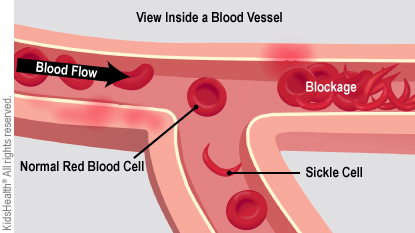L-Glutamine for People With Sickle Cell Disease
What Is L-Glutamine?
L-glutamine is an amino acid made by the body. It also can be made in a lab for use as a treatment for sickle cell disease. (The brand name is Endari®.) L-glutamine slows the damage that can happen from blockages caused by sickle cells. People with sickle cell disease who take L-glutamine may have fewer pain crises and hospital visits.
What Happens in Sickle Cell Disease?
Healthy red blood cells are soft, flexible, and round. Sickle cell disease makes red blood cells become sticky, hard, and C-shaped. The sickle cells get stuck and block the blood flowing inside small blood vessels. This can be painful and lead to other problems that need to be treated in a hospital.
Sickle cells also break down more quickly than healthy red blood cells. Not having enough red blood cells can lead to anemia. People with anemia feel tired and have less energy.

How Does L-Glutamine Help People With Sickle Cell Disease?
L-glutamine (pronounced: el-GLOOT-ah-meen) helps reduce damage to red blood cells that happens with sickle cell disease. The red blood cells stay round, break down less quickly, flow more easily, and get stuck less often.
Who Can Take L-Glutamine?
People 5 years and older can take L-glutamine.
You can take L-glutamine whether or not you already take the medicine hydroxyurea for sickle cell disease.
What’s It Like to Take L-Glutamine?
Here are the basics of taking L-glutamine:
- Type of medicine: It comes as a powder. You mix it into a drink, such as water or juice, or into a food like yogurt or applesauce.
- Dose: People who take L-glutamine take it twice a day.
- Timing: You take it at the same times every day. (Some people like to set reminders on their phone.)
Does L-Glutamine Cause Side Effects?
Most people who take L-glutamine do well. Side effects can include stomach pain, constipation, nausea, a headache, or a cough. Rarely, someone might have pain in their back, chest, legs, or arms.
How Much Does L-Glutamine Cost?
The amount you pay (if anything) for L-glutamine will depend on your insurance. Ask your doctor for more information. Some programs may be able to help pay for out-of-pocket costs.
If your care team recommends L-glutamine for you, talk to them about it. Ask questions and share any concerns. Talk it over with a parent or an adult you trust. Soon you’ll be ready to make a choice you can feel good about.
